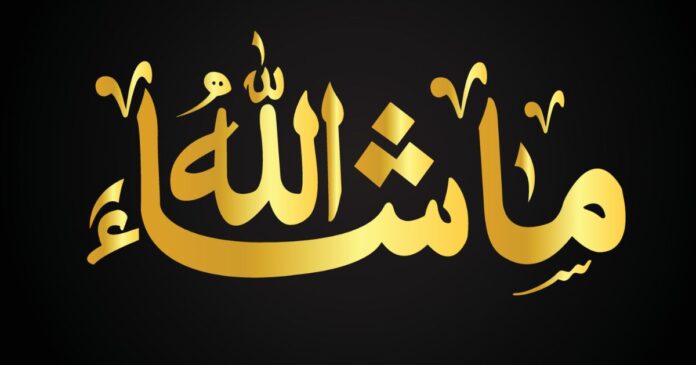The Arabic phrase “Mashallah” is commonly used in Muslim cultures worldwide. But what exactly does it mean, where does it come from, and Why Do People Say Mashallah When They See One Another? This article explores the roots, meaning and usage of Mashallah.
Breaking Down the Meaning of Mashallah
The term Mashallah comes from three Arabic components:
Mā (ما) – a particle meaning “what.”
Shāʾ (شاء) – 3rd person masculine past tense conjugation of the verb meaning “to will” or “to want.”
Allāh (الله) – the Arabic word for God or Allah.
So grammatically, it consists of: “What + Allah wanted/willed.”
When these elements are combined, Mashallah means:
“Whatever Allah willed has happened.”
Or “That which Allah willed (to happen has happened).”
It recognizes and praises that an event has occurred in alignment with Divine will and destiny.
The Origins and History Behind Mashallah
Mashallah has its roots in Islamic theology and the teachings of the Quran.
The phrase emphasizes that according to Muslim faith, everything in existence and everything that happens is by the eternal will and decree of Allah. As the Quran states:
“And you cannot will unless Allah wills. Indeed, Allah is ever Knowing and Wise.” (Quran 76:30)
Based on this, when Muslims witness something good or impressive happen, they exclaim Mashallah, acknowledging Allah’s will and hand behind it. This tradition traces back centuries.
Why Muslims Say Mashallah in Various Contexts
Due to its significance in Islamic belief, Mashallah is used frequently in Muslim cultures:
- Upon seeing something beautiful like nature, architecture, or art, people say Mashallah to recognize its beauty as a blessing from Allah.
- When someone has good fortune like a job promotion or marriage, saying Mashallah expresses gratitude to Allah for enabling this.
- With children or achievements, Mashallah shows appreciation that they are Divine gifts.
- It can even convey a sense of protectiveness over something good against jealousy or ill fortune by acknowledging Allah’s role in that blessing.
Using Mashallah to Avert the Evil Eye
There is also a common cultural belief that saying Mashallah can ward off the ‘evil eye’ – envy or ill wishes from others that could negatively impact a blessing or achievement one admires.
So people may proactively exclaim Mashallah when they notice something impressive to acknowledge and praise Allah’s role in giving that gift or trait. This is thought to avert potential jealousy through takbeer (glorifying Allah).
Nuances in Employing Mashallah
While well-intentioned, overusing Mashallah inappropriately can seem excessive or insincere. It should come from a genuine belief in Divine Providence. Used properly, Mashallah remains a meaningful phrase in Muslim cultures to recognize Allah’s blessings great and small. It reflects deep faith and humility before God.
How and Why Do Muslims Say Mashallah Upon Seeing One Another?
When Muslims meet each other, it is common for them to exchange the phrase Mashallah. But why is this customary response used in this context?
Recognition of Beauty as Blessing
In Islamic belief, physical beauty is considered among the blessings Allah grants His creations. Thus, when Muslims meet, saying Mashallah is a way to acknowledge and praise the God-given beauty and grace they perceive in each other.
Expression of Admiration
Muslims consider all positive traits like elegance, dignity and good character as gifts from Allah designed to help people fulfill their spiritual purpose. Saying Mashallah conveys admiration and appreciation of these merits.
Protection From Ill Will
There is a cultural belief that the ‘evil eye’ – jealousy or envy – can affect blessings. By praising Allah for the beauty and character they observe, people also hope to protect others from potential ill will.
Demonstration of Humility
Mashallah said upon meeting reflects humility and inner peace, focusing attention on Allah rather than egotistic impulses. Both parties affirm divine gifts in each other.
Solidification of Faith
Uttering this common phrase reinforces shared Islamic beliefs regarding Allah’s role as the originator and sustainer of all things praiseworthy. It bonds faith.
Customary Etiquette
Just as handshakes or smiles signal welcome in other cultures, using Mashallah has become a customary Islamic greeting expressing joy, protection, and belief when meeting fellow Muslims.
So this ubiquitous phrase serves multiple spiritual purposes within social interactions, allowing Muslims to connect with each other through shared faith.
Reflecting on the Meaning of Gratitude in Mashallah
Beyond its literal meaning, the phrase Mashallah carries deeper lessons about gratitude:
- It teaches awareness that all things, from the mundane to the miraculous, are gifts from Allah. This mindset of abundance nurtures perpetual thankfulness to Him.
- Mashallah cultivates humility and temperance of the ego by attributing accomplishments and talents solely to Allah’s generosity rather than our own merit.
- When said upon perceiving beauty or skill in others, it shifts focus away from honoring people and towards recognizing the Divine gifts within them.
- Mashallah inspires marvel at the inherent wonder of all creation, formed through Divine genius beyond human comprehension.
- It fosters resilience and optimism, as accepting Allah’s will makes both blessings and hardships bearers of higher purpose and wisdom.
- Mashallah provides comfort amidst life’s uncertainties, reassuring that all that transpires has beauty, benefit and meaning decreed by the Creator.
Thus, this common phrase encapsulates an entire mindset defined by perceiving the grace of Allah throughout every inch of existence. It transforms mundane moments into spiritual communion.
Learn More about Nazra Quran.







